“No task seems more urgent than the protection of democracy at home and abroad,” for President Joe Biden, notes James Traub, a nonresident fellow at New York University’s Center on International Cooperation.
Secretary of State Antony Blinken told me last month, “In every conversation I’ve heard him have with a foreign leader, the centerpiece of the conversation has been that he sees the fundamental struggle of our time as the face-off between autocracy and democracy. And that’s its fundamental for the U.S. to lead the effort towards democratic resilience and reinvigoration around the world,” he writes for POLITICO.
 Europeans have long looked askance at the American pastime of spreading democracy; it had been widely assumed that many of America’s chief allies would merely tolerate Biden’s Summit for Democracy. But they now assent to his view that democratic and autocratic states are increasingly engaged in a “contest of models” and hope the summit will help harden Western democracies against the external threat from Russian disinformation and China’s export of surveillance technology, adds Traub, the author of What Was Liberalism? The Past, Present and Promise of A Noble Idea.
Europeans have long looked askance at the American pastime of spreading democracy; it had been widely assumed that many of America’s chief allies would merely tolerate Biden’s Summit for Democracy. But they now assent to his view that democratic and autocratic states are increasingly engaged in a “contest of models” and hope the summit will help harden Western democracies against the external threat from Russian disinformation and China’s export of surveillance technology, adds Traub, the author of What Was Liberalism? The Past, Present and Promise of A Noble Idea.
“The days when democracy and cosmopolitanism were both thought to be dominant, that they would steamroll through the world—the end-of-history thesis—those days are behind us,” said Manuel Muniz Villa, a former senior official in Spain’s Foreign Affairs Ministry, now provost of IE University in Madrid. Biden, he predicted, “will find much more receptive states than even a few years ago.”
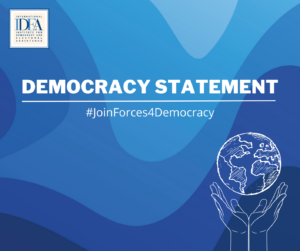 The week’s events have laid bare competing crosscurrents of Biden’s foreign policy — at once isolating anti-democratic regimes while also trying to engage their leaders, CNN’s Kevin Liptak suggests. It’s a balancing act that crystallizes the competition Biden sees as defining the rest of the 21st century — democracy vs. autocracy — while showing some echoes of the previous one.
The week’s events have laid bare competing crosscurrents of Biden’s foreign policy — at once isolating anti-democratic regimes while also trying to engage their leaders, CNN’s Kevin Liptak suggests. It’s a balancing act that crystallizes the competition Biden sees as defining the rest of the 21st century — democracy vs. autocracy — while showing some echoes of the previous one.
Planning for the summit exposed the disputes that have beset many administrations over the role of democracy in American foreign policy, Traub adds in POLITICO. National security adviser Jake Sullivan sought to signal the administration’s commitment by establishing a new NSC position, coordinator for democracy and human rights. To fill the position, he hired Shanthi Kalathil, a senior figure at the National Endowment for Democracy. She and her aides began to hold meetings with agencies across the government.
The summit needs to ensure that its deliberations generate an agenda for concrete actions over the coming year, democracy advocates insist.
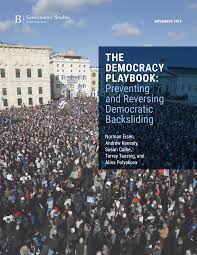 The Summit can lay the groundwork for the creation of an ambitious new club for liberal democracies, say Christopher Sabatini, a senior research fellow at Chatham House, and Ryan C. Berg, a senior fellow in the Americas Program at the Center for Strategic and International Studies, where he is the director of the Future of Venezuela Initiative. Membership in this club must come with both financial and political benefits that outweigh what competing authoritarian regimes are offering. Such perks should include development assistance through a global democracy fund, they write for Foreign Policy:
The Summit can lay the groundwork for the creation of an ambitious new club for liberal democracies, say Christopher Sabatini, a senior research fellow at Chatham House, and Ryan C. Berg, a senior fellow in the Americas Program at the Center for Strategic and International Studies, where he is the director of the Future of Venezuela Initiative. Membership in this club must come with both financial and political benefits that outweigh what competing authoritarian regimes are offering. Such perks should include development assistance through a global democracy fund, they write for Foreign Policy:
- The first step in the democrat’s playbook is for a community of liberal democracies—such as those gathered at Biden’s summit—to define a set of tipping points on the path to democratic erosion, such as rolling back the independence of judicial systems, rigging electoral systems to favor the incumbent party, and closing off civic space for media and civil society. Then, liberal democracies have to muster the political will to respond collectively when autocrats and their movements reach these tipping points……
- The second step in the democrat’s playbook should be to reform and update the Bretton Woods institutions—the World Bank and the International Monetary Fund (IMF)—such that they include conditions for democratic governance and human rights in lending and technical assistance standards and procedures. ….
Values are interests
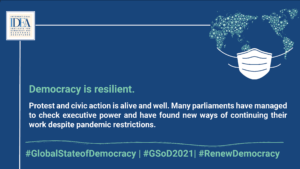 For the first time in our lifetimes, it is no longer obvious that liberal democracy will prevail over its ideological rivals, say Richard Fontaine, CEO of the Center for a New American Security, and Daniel Twining, president of the International Republican Institute. Democracies could jointly create a new international fund to support local forms of investigative journalism that expose corruption and human rights abuses, they write for American Purpose:
For the first time in our lifetimes, it is no longer obvious that liberal democracy will prevail over its ideological rivals, say Richard Fontaine, CEO of the Center for a New American Security, and Daniel Twining, president of the International Republican Institute. Democracies could jointly create a new international fund to support local forms of investigative journalism that expose corruption and human rights abuses, they write for American Purpose:
They might establish democratic supply chains that prevent hostile authoritarian nations from weaponizing commodities they control, like high-end technology or medical supplies. They could create a “political Article 5,” similar to NATO’s mutual-defense provision, for allied nations subject to authoritarian interference in their democratic practice. And the summit might launch new democratic alliances like the existing Quad, which unites the United States with India, Australia, and Japan; or like the aspirational T12 group of advanced techno-democracies.
Engaged citizenship can be transformative, argue Michelle Bachelet, United Nations High Commissioner for Human Rights, Ford Foundation President Darren Walker and Mark Malloch-Brown, a former deputy United Nations secretary-general and President of the Open Society Foundations. In Moldova and Malaysia, for example, civil-society organizations helped to overturn repressive “state of emergency” laws this year, preventing the dangerous erosion of democratic institutions.
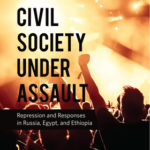
Carnegie
As states engage in virtual conversation this week, they must be prepared to move beyond rhetoric and affirm the importance of these rights by matching words with deeds in the fight for civic space, they write for Project Syndicate:
- In the human-rights domain, this means advancing international and national protections for free speech and free assembly, thereby ensuring every individual’s right to voice dissent in the face of authoritarianism….
- Most urgently, global leaders must substantially increase investments in the civil-society organizations that provide a critical check on state power. And they must commit tangible resources to human-rights defenders, local journalists, social services, and community centers…
- Lastly, leaders must unite around the common democratic cause and collaborate closely in multisector, multilateral partnerships. Across government, the philanthropic sector, the private sector, and civil society, we have an opportunity to build on the dialogue at the summit and use our unique strengths to expand civic space…..
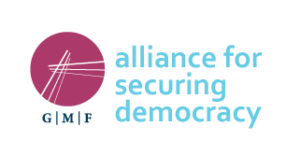 The summit will launch a “year of action” and a follow up summit in 2022, presenting the opportunity to shake things up, notes Laura L. Thornton, director and senior fellow at the Alliance for Securing Democracy at the German Marshall Fund. Follow-on events should be inspirational, promote innovation, and renew connections among the world’s democrats, she writes for The Hill:
The summit will launch a “year of action” and a follow up summit in 2022, presenting the opportunity to shake things up, notes Laura L. Thornton, director and senior fellow at the Alliance for Securing Democracy at the German Marshall Fund. Follow-on events should be inspirational, promote innovation, and renew connections among the world’s democrats, she writes for The Hill:
- First, the 2022 summit should not be one of heads of state but of democrats — a decentralized affair where community organizers, youth leaders, town clerks, LGBTQ activists, election experts, and the diversity of people working to defend their democracies and build democratic resilience come together. Share what’s worked and what hasn’t….
- Second, the administration could outsource agenda development to a wide range of players, perhaps creating “summits” in each region of the world. The organizers could build an interactive online platform where democrats could organize their own panels, upload videos, stream podcasts on a multitude of themes…..
- Third, the commitments could be live documents. As parliaments have done in many parts of the globe with draft legislation, each country’s commitments could be fully accessible, allowing citizens to comment, suggest changes, and develop benchmarks to measure progress.
Losing democracy happens in much the same way as a character goes bankrupt in Ernest Hemingway’s “The Sun Also Rises”: “gradually, and then suddenly,” @IlvesToomas writes in @TheEconomist https://t.co/cByX5ONPqs
— Democracy Digest (@demdigest) December 8, 2021
Losing democracy, a trend over the past decade, happens in much the same way as a character goes bankrupt in Ernest Hemingway’s “The Sun Also Rises”: “gradually, and then suddenly,” notes Toomas Hendrik Ilves, president of Estonia from 2006 to 2016. At first the changes are minor—a shift in tone, a reinterpretation of rules, a weakening of independent oversight. It’s just enough to get political opponents and independent media howling (which they do anyway) but not so much to cause unease in the public, he writes for The Economist:
The citizenry in democracies has been lulled by the victory against authoritarian rule when the Soviet Union collapsed 30 years ago. Convinced that “we won, therefore it can’t happen here,” we feel immune to the threat, and believe authoritarianism is something that happens to others, not us. Yet at home we let the corruption slide, the slow creep of one set of rules for those in power, a different set for the rest. Yet we are on the same slippery slope as those we criticize elsewhere.
 Three frivolous lawsuits known as SLAPPS – “strategic lawsuits against public participation,” – have been filed in the past month against OCCRP’s Serbian member center KRIK, making a total of 10 legal actions currently facing the Belgrade-based investigative media outlet, the group writes. These SLAPPS, which are brought against journalists in order to silence them, appear to be part of a coordinated campaign by political powers to weaken KRIK – a partner of the National Endowment for Democracy (NED) – and further quash independent media in the country.
Three frivolous lawsuits known as SLAPPS – “strategic lawsuits against public participation,” – have been filed in the past month against OCCRP’s Serbian member center KRIK, making a total of 10 legal actions currently facing the Belgrade-based investigative media outlet, the group writes. These SLAPPS, which are brought against journalists in order to silence them, appear to be part of a coordinated campaign by political powers to weaken KRIK – a partner of the National Endowment for Democracy (NED) – and further quash independent media in the country.
During a week in which journalists Maria Ressa and Dmitry Muratov are receiving the Nobel Peace Prize and U.S. President Joe Biden is convening the Summit for Democracy — to which Serbian officials have been invited — the continuous threats against KRIK underscore the immense challenges many journalists face and the need for strong legislation that protects reporters and the political will to uphold these protections, the OCCRP adds.

Credit: Solidarity Center
In advance of the Summit for Democracy, U.S. Secretary of Labor Marty Walsh has announced the Multilateral Partnership for Organizing, Worker Empowerment and Rights initiative – the largest commitment by the U.S. government to advance worker empowerment and trade union rights.
At a virtual event, Walsh joined AFL-CIO President and NED board member Liz Shuler, General Secretary of the International Trade Union Confederation Sharan Burrow, Director General of the International Labor Organization Guy Ryder, and Shawna Bader-Blau of the Solidarity Center, a core NED Institute, to announce M-POWER’s $120 million investment funded by the Department of Labor, Department of State and the U.S. Agency for International Development, which will:
- Strengthen free and independent trade unions.
- Support labor law reform and enforcement.
- Promote worker organizing and innovative use of collective bargaining.
- Extend labor law coverage to protect workers employed in low-wage jobs and sectors often excluded from labor law protection, particularly in the informal economy.
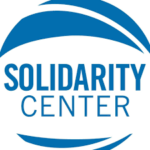 “Threats to democracy go hand-in-hand with threats to workers’ right to form unions,” said the AFL-CIO’s Shuler.
“Threats to democracy go hand-in-hand with threats to workers’ right to form unions,” said the AFL-CIO’s Shuler.
A $100 million pledge through Funders Organized for Rights in the Global Economy (FORGE) is an important statement for philanthropy to do its part keeping worker rights and justice central to its work, said Open Society Foundation Executive Director Thomas Periello.
“No social or political progress happens by magic. Change is pushed by people working collectively,” said Solidarity Center’s Bader-Blau. “And legitimacy of the government comes from the people.”
Day Zero of the Summit – December 8, 2021 – includes the following sessions (for the full agenda go here):
-
Championing Women’s Political and Civic Participation and Leadership as the Lifeblood of Democracy
- Speakers:
- Nelly Mutti – Speaker, National Assembly of Zambia
- Patricia Zanella – Hurford Youth Fellow, National Endowment for Democracy
- May Sabe Phyu – Activist
- Speakers:
 Expanding Civic Space: Empowering Human Rights Defenders and Independent Media Within and Across Borders 6:20 am – 7:30 am
Expanding Civic Space: Empowering Human Rights Defenders and Independent Media Within and Across Borders 6:20 am – 7:30 am
- Hosted by Samantha Power – Administrator, U.S. Agency for International Development
- Moderated by Damon Wilson – President and CEO, National Endowment for Democracy
- Speakers:
- Luis Rodolfo Abinader Corona – President of the Dominican Republic
- Lazarus Chakwera – President of Malawi
- Sherrilyn Ifill – President, NAACP Legal Defense Fund
- Irene Khan – UN Special Rapporteur on Promotion and Protection of Freedom of Opinion and Expression
- Swe Win – Editor-in-Chief, Myanmar Now
- Mohamed Zaree – Egypt Director, Cairo Institute for Human Rights Studies
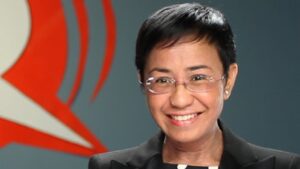
Credit: Rappler
Also on Day Zero of the Summit, the National Endowment for Democracy (NED) hosts a forum featuring vital voices from the frontlines of democratic struggle, including this year’s Nobel Peace Prize winner, Philippine journalist Maria Ressa (right). Activists from Hong Kong, Nicaragua, Nigeria, and Russia will discuss global challenges to democracy in conversation with US Legislators. Dedicated and experienced democracy advocates will share insights and expertise on how to rebuild democratic momentum. Former heads of government who helped lead democratic change will reflect on how to sustain post-transition democracy. December 08, 2021. 12:30 pm – 02:00 pm. WATCH LIVE ABOVE.
Engaged citizenship can be transformative, @mbachelet @UNHumanRights @darrenwalker @FordFoundation & @malloch_brown @OpenSociety write for @ProSyn https://t.co/GoPzLOxuNB
— Democracy Digest (@demdigest) December 8, 2021







